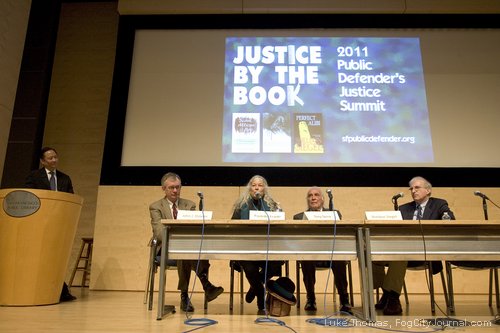
The 2011 Justice Summit held at the Civic Center Library, May 18, and sponsored by Public Defender Jeff Adachi (left) included a general panel discussion on the criminal justice system. Panelists from left to right: Authors John Osborne, Paulette Frankl, Defense Attorney Tony Serra and Author Sheldon Siegel. Photos by Luke Thomas.
The 2011 Public Defender’s Justice Summit provided plenty of inspiration for those dedicating their lives to this kind of work and those hoping to do so.
May 25, 2011
In his opening remarks at his annual summit on criminal justice on May 18, San Francisco Public Defender Jeff Adachi assured the audience that this year’s conference was to be “by far, the most exciting” of the seven he has organized and hosted.
The first panel looked promising enough. It included John Osborne, author of The Paper Chase, a favorite of first-year law students for decades and a wry critique of the traditional approach to legal education; Paulette Frankl, a courtroom sketch artist who wrote 2010’s Lust for Justice, which is about legendary defense attorney Tony Serra; Tony Serra; the fiery, counter-culture defense attorney considered to be among the very best in the nation; Mary McDonagh Murphy (via Skype), who wrote Scout, Atticus and Boo, a book about the story behind the writing of To Kill a Mockingbird; and Sheldon Siegel, a part-time corporate attorney who has penned a series of popular mystery novels featuring a team of fictional San Francisco defense attorneys — the most recent of which is Perfect Alibi.
Osborne, Frankl, Serra, McDonagh Murphy, and Sheldon were asked to focus on “the meaning of justice.” And at about the mid-point in the discussion, a little theater took place in the Koret Auditorium of the San Francisco Main Library which made it evident that this, indeed, would be no dull, dry affair
That’s when Serra pounced on Osborne, so to speak.
A remark from the amiable Osborne that the law “work[s] really well” as practiced on Wall Street, set off Serra, the defender of the likes of the Symbionese Liberation Army, the Black Panthers, and Earth First!
Since “nothing meaningful ever comes from a seated attorney,” Serra sprang to his feet, turned toward Osborne and thundered, “Wall Street lawyers are serving the capitalistic corporations that have taken our democracy hostage. They’re shifting money from one capitalistic entity to another in a manifestation of the malfunction of the entire system!”
Serra long ago took a vow of poverty.
Osborne did not flinch at the torrent of words coming from the man nicknamed, “The Semantic Samarai.” He coolly quipped in an aside to the audience, “Why do I feel like you are with him?” and then reiterated his point.
“Wall Street lawyers do great law,” Osborne said. ” It’s the best practice of law in the country, and if you don’t believe that, you don’t know what you’re talking about.”
Serra fired back: “I know that death penalty appellate lawyers do the best practice of law in the country. Their objective is valid, and their industry matches your industry’s competency!”
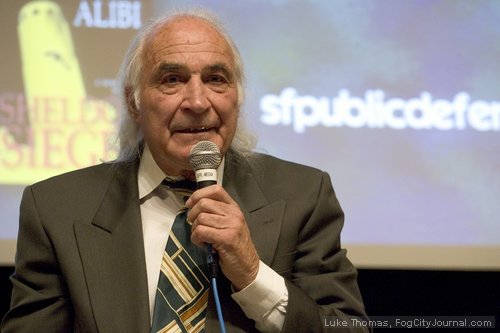
Defense Attorney Tony Serra.
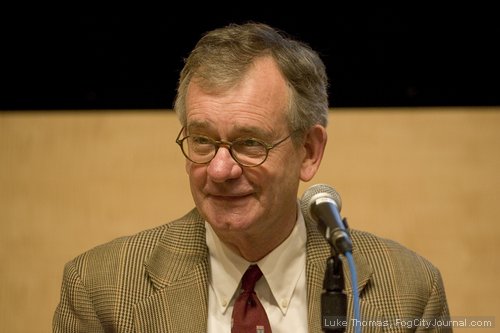
Author and attorney John Osborne.
Besides offering sheer entertainment value, that moment crystallized a sub-textual theme than ran throughout the entire day. That theme might be phrased as, “Defending the accused is a true and noble cause.”
Perhaps this is particularly so when the accused lives in poverty.
Despite depiction of the typical defense attorney as a sleazy, lazy twister of truth and obstruction to justice on television shows such as “Law & Order,” many choose to put their legal skills to use as advocates for those charged with crimes for some pretty high-minded reasons. Some feel a need to fight to make sure the U.S. Constitution still means something at a time when the country’s highest court has been chipping away at fundamental rights such as the protection against illegal search and seizure. Others see defending the indigent as a particularly worthwhile mission during a period of history when social welfare programs have been gutted, the War on Drugs has continued unabated, and prisons across the country have been jammed with the penniless and drug-addicted.
But thanks to the decimation of government funding, an opening in any of the public defender offices across the state has become a rarity. This grim reality has caused Adachi concern. He says he’s worried the opportunity to train a new generation of public defenders will be lost. Many public defender offices have gone through at least one round of cuts, if not several. In many more, the lead defenders are unsure whether they will be able to fill existing and future vacancies. Like all San Francisco agencies, Adachi’s office is facing budget reductions of 10 to 20 percent. In Fresno County, the public defenders even have to fend off recurring moves at the local board of supervisors to get rid of their department altogether.
Meanwhile, public defenders who do have jobs find themselves contending with higher and higher caseloads. In a single morning in Fresno, for example, one public defender handling misdemeanors had to deal with more than 100 client-matters scheduled before the court. More than 50 in one morning is not unusual. According to the website for the public defender’s office in San Francisco, the 93 attorneys who work in the office represent 23,000 people annually
It’s a difficult and exhausting job, but one that is crucial to the administration of justice.
Even though that was not the stated purpose, Adachi’s summit brought that to light.
Other parts of the summit that hit indirectly on the “defense is a noble cause” theme included:
§ San Francisco defense attorney Stuart Hanlon pointing to the firmly held belief among some police officers that “the ends justify the means” as the aspect of departmental culture than leads to cops abusing the power and privilege of the job.
Hanlon is best known for defending “Geronimo” Pratt, a former Black Panther leader who spent nearly 30 years in prison before it was revealed that the prosecution failed to turn over key evidence pointing to Pratt’s innocence. Hanlon was one of the speakers on the second panel, which was focused on police misconduct. The others were newly minted San Francisco Police Chief Greg Suhr; former Tiberon police chief Greg Herley; San Francisco Deputy Public Defender Anne Irwin; and John Burris, the Bay Area’s go-to lawyer for those who have suffered civil rights abuses at the hands of police.
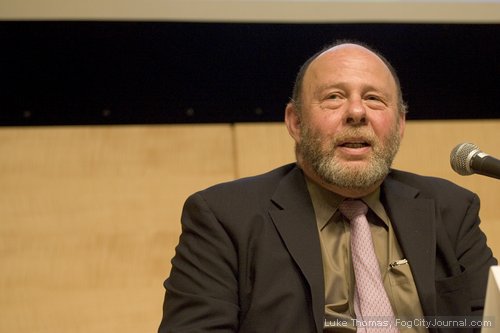
Defense Attorney Stuart Hanlon.
From cops running brothels and stealing drugs to officers busting into SRO hotel rooms and conducting warrantless searches, the number of Bay Area news headlines given over to “cops gone wild”-type scandals over the past six months seems to have reached “an epidemic,” as retired San Francisco Superior Court judge Lee Baxter put it. Baxter deftly monitored the panel on police misconduct.
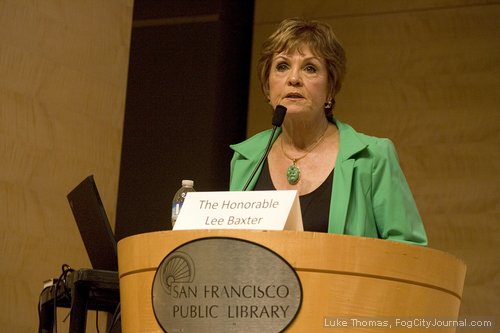
Retired San Francisco Superior Court judge Lee Baxter.
(For a detailed account of the police misconduct panel discussion, see San Francisco Bay Guardian reporter Sarah Phelan’s May 19 story, “Perception of Lost Integrity Costs Police.”)
§ San Francisco Deputy Public Defender Anne Irwin talking about how public defenders have “the unique and natural role as [the] messenger” bearing news of how commonly instances of police misconduct actually occur. “We have more interaction with victims of police misconduct than anyone else in government,” she said. “We get into the intimate details of lives in the course of representing them and developing a relationship of mutual trust.”
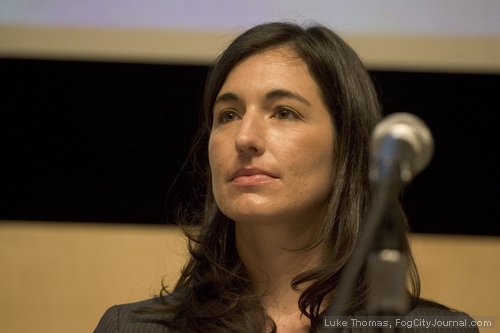
Public Defender Anne Irwin.
§ John Thompson, a man who spent 14 years on death row in Louisiana and went through “death watches” seven times before a jury exonerated him, describing what his life was like during that time.
Thompson founded “Resurrection After Exoneration,” an organization dedicated to helping former death row inmates re-enter society. A speaker on the death penalty panel, Thompson was joined by District Attorney George Gascón, Jeanne Woodford, a former warden at San Quentin Prison who now advocates for abolishing the death penalty and recently was profiled by the San Francisco Chronicle, and Natasha Minsker, the death penalty policy director for the Northern California chapter of the American Civil Liberties Union.
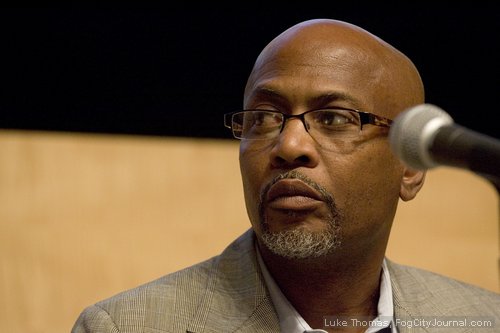
John T. Thompson spent 14 years on death row in Louisiana’s notorious Angola prison before being exonerated of his 1985 conviction for murder.
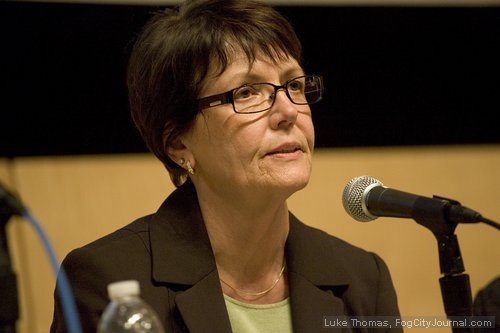
Former San Quentin Warden Jeanne Woodford.
(For an account of the death penalty discussion, see the May 18 Bay City News article, “DA Gascón Speaks For, Former San Quentin Warden Against, the Death Penalty.”)
§ Matt Gonzalez, using the skills he honed conducting direct and cross examinations as a public defender, persistently try to pin Gascón down on his nebulous position on the death penalty. Gascón has said that while he is “not categorically opposed to the death penalty” and would consider it appropriate in some cases, he “personally does not believe the death penalty is a good tool.”
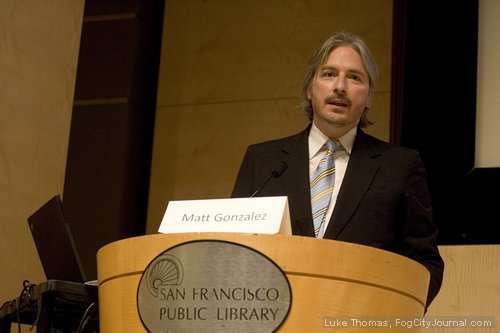
Public Defender Chief Attorney Matt Gonzalez.
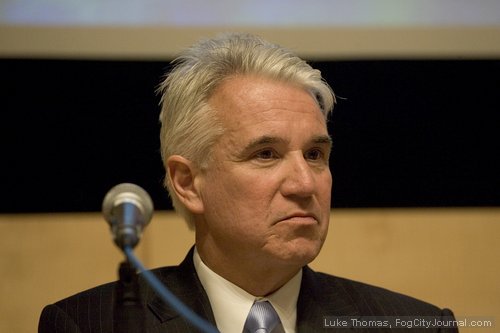
San Fracnisco District Attorney George Gascón.
Gonzalez, a former president of the San Francisco Board of Supervisors, recently re-joined the public defender’s office as Chief Attorney. When Gonzalez asked Gascón if he was “a pro-death penalty district attorney,” Gascón replied, “no.” However, Gascón said, “As chief prosecutor he [thought] it [was] inappropriate to say that [he] categorically would not support a law on the books.” Then he listed a number of problems associated with the death penalty, such as the disturbing fact that people of color receive the sentence more often than whites.
Gonzalez followed up with, “Would you support efforts statewide to get rid of the death penalty?” Gascón answered, “That’s what I’m saying.”
The ACLU’s Minsker said she did not know of any district attorneys [other than former San Francisco District Attorneys Terence Hallinan and Kamala Harris] in the state who publicly have taken the position never to do death penalty prosecutions, but was aware of a number who have “quietly decid[ed] not to pursue the death penalty.”
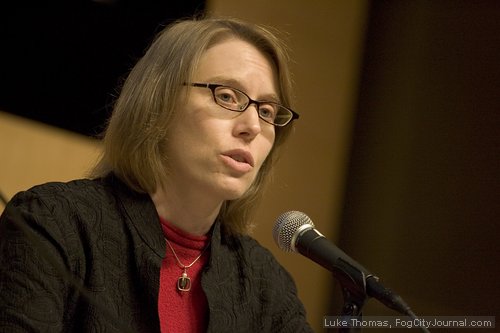
ACLU Attorney Natasha Minsker.
Gonzalez remarked, “I think our district attorney fits that description.”
At the end of the summit, Adachi pointed out that Thompson was exonerated because a prosecutor came forward and revealed that the district attorney in the former death row inmate’s case had intentionally withheld evidence showing Thompson was innocent.
Said Adachi, “There are heroes everywhere.”
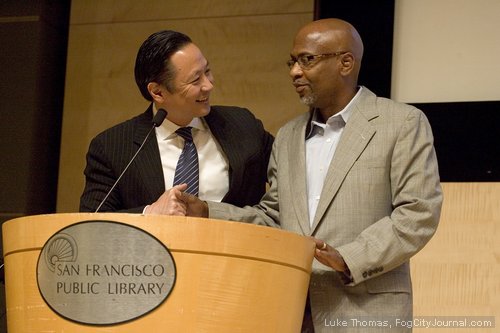
Public Defender Jeff Adachi and John T. Thompson.
A newspaper reporter for 14 years prior to attending U.C. Berkeley School of Law, Savannah Blackwell recently completed a post-graduate fellowship in the misdemeanor unit of the Office of the Public Defender, San Francisco.



 The Hunger Site
The Hunger Site
May 27, 2011 at 9:25 am
…with freedom and justice for ALL…I think not.
May 26, 2011 at 7:57 am
Also, it would be much more of a public service if the conference had included a cross -section of prisoners when talking about public defense.
The very few innocence cases presented – while heartbreaking – are an exremely small number of those represented by defense lawyers and not reflective of the multitudes of cases filling our prisons and jails.
By presenting only these cases, the lawyers seemed to want to pat themselves on the back rather than tackle a complex and tragic reality of how the vast majority of their clients lives are affected.
The conference and discussion would have had a more critically, engaged and dare I say *real* discussion if the lawyers were more critically thinking in general – about themselves, their own profession, and about the the complexity of most of their clients’ lives and how the system (prosecution, defense and punishment) affects them. That means the non-innocence cases, and it means all the cases that were pled out to unjust, severe sentences. Those multitudes are a massive tragedy.
Too bad the reporter’s story above was not more probing or critical in this regard, either.
May 25, 2011 at 7:11 pm
A great conference, but I think most of us who have been imprisoned no longer have the rose-colored glasses on that defense lawyers always or even often, present a noble cause.
In SF, there are many defense attorneys who walk a progressive, liberal, or even radical l ine, especially in the press, but who in their work sell out their clients, and work far more tightly with and for prosecutors than they do with or for their clients whom they claim to defend.
Wouldn’t it be a simple world if dirty SF politics and old boys attorney network didn’t exist in SF? Ah, but it does, and big money and government fees are there for the taking.
I loved many aspects of the conference, agreed with the politics, and do support the work of many cases. \
However isn’t it better to take accurate and honest stock of the defense industry rather then presenting a narrative that in it’s lack of balance and complexity amounts to a folk tale?
Serra’s particular comment about death penalty appellate attorneys is also way too simplistic. Make no mistake – as wretched and barbaric as the death penalty system is – death penalty appellate attorneys are very much part and parcel of that system, the death business. They may talk politics and abolition, but they’ve made huge salaries and a gread livlihood for their families off of the issue. And the reality is, that taints them. And their clients? – there they sit.
Get real. Want to learn about criminal justice? Then be sure – at least – to talk to the people who are not making a dime off of it.
And be sure to read Amy Bach’s Ordinary Injustice to get a more balanced view of the industry of defense lawyers.
May 25, 2011 at 3:58 pm
h, agree about ‘richmondman’, he’s obviously been out in the fog belt too long and it’s clouded his mind.
See ya Saturday.
ROOT FOR BUSBY’S BOYS.
Screw that doofus LT.
Rule Brittania.
GO GIANTS.
May 25, 2011 at 1:29 pm
Great piece Savannah, hope to be reading more of you again.
I used to be against the death penalty in all cases until we all saw the video of Romanian dictator Nicolae Ceaucescu and wife offed by a summary trial on Christmas day 1989. Now I can see a space for the death penalty when the instruments of death are wielded in an official, industrial scale by unaccountable power.
The death penalty clearly has no practical place in American criminal jurisprudence. I would be philosophically open, however, to exploring how the death penalty might be applied solely on an ability to pay basis, where it is only available to those who have the liquid resources, say $500K and above, on hand at arrest time to afford it.
That, and elected officials who commit crimes against democracy and break their campaign promises.
-marc
May 25, 2011 at 12:49 pm
Hey Richmondman,
Who are you? Not said aggressively or anything but one writer to another, you’re a good writer. Followed you through various chats over the years. If you won’t ID yourself, give me a hint. I’m an old retired school teacher and you guys are my soap opera.
And, I’ve gotten to know most of you first hand.
Including, Gonzalez.
Rest assured that he’s a top flight public defender. He and Jeff have worked together since the early 90’s in the PD’s office. He does his job. You call Matt a ‘career politico’ but he’s spent 4 years in office and almost 20 as a public defender (SF and own law practice).
Matt says that in the 10 years or whatever he was away from the PD’s office that Jeff has made it 10 times more efficient. It has to be with their caseload.
Gonzalez for Mayor!
Adachi for Mayor!
Avalos for Mayor!
Baum for Mayor!
Go Giants!
Bumgarner at China Basin tonite at 7:15pm
Daly’s Dive for EU finals 11am Saturday!
h.
May 25, 2011 at 10:32 am
Per the author “an opening in any of the public defender offices across the state has become a rarity. This grim reality has caused Adachi concern. He says he’s worried the opportunity to train a new generation of public defenders will be lost” – and yet Jeff was able to get a career politicial – Matt Gonzalez – a plum job. I wonder what Matt’s case load is like….when he isn’t working on pension reform, or Jeff’s campaign.
May 25, 2011 at 8:49 am
Savannah, don’t know if I’ve just missed your stuff, but REALLY good to hear your voice again.